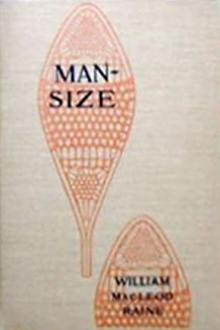Laughing Bill Hyde and Other Stories by Rex Beach (ebook smartphone .TXT) 📗

- Author: Rex Beach
Book online «Laughing Bill Hyde and Other Stories by Rex Beach (ebook smartphone .TXT) 📗». Author Rex Beach
"Oh, I see! This is Gross's night at the Maccabbees', isn't it?" Louis gloated brutally over her confusion. "Sorry, but I'll probably have to entertain some more customers. The firm is keeping me busy."
At the office things went most pleasantly for the next few weeks; sixty per cent. of the city's railroad business came to Comer & Mathison; the clerks began to treat Mitchell as if he were an equal; even Gross lost his patronizing air and became openly hateful, while Murphy—Louis no longer called him Mister—increased his assistant's expense account and confided some of his family affairs to the latter. Mr. Comer, the senior partner, began to nod familiarly as he passed the quotation clerk's desk.
Nor were Louis's customers all so eccentric as Miss Dunlap. Phoebe Snow, for instance, was very easy to entertain, and the Northwestern took to his custody like a hungry urchin to a barbecue. He gave them each one night a week, and in a short time all his evenings were taken, as a consequence of which he saw less and less of Miss Harris. But, although he and his manicurist were becoming strangers, he soon began to call the waiters at Rector's by their given names, and a number of the more prominent cab-drivers waved at him.
One morning when, for the tenth successive time, he slid into his desk-chair an hour late, Mr. Comer bowed to him, not only familiarly, but sarcastically, then invited him to step into his private office and see if he could locate the center of the carpet. It was a geometrical task that Louis had been wishing to try for some time.
The senior partner began with elaborate sarcasm. "I notice you're not getting down until nine o'clock lately, Mr. Mitchell. Is your automobile out of order?"
"I have no automobile, Mr. Comer," the youth replied, respectfully.
"No? I'm surprised. Well, if eight sharp is too early, you may set your time."
Mitchell tried his best to appear disconcerted. "You know I'm busy every evening with my trade," said he.
"Nonsense. I've seen you out with a different dressmaker every night that I've been down-town."
"Those are not dressmakers, they are stenographers from the railroad offices. I'm sorry you're not satisfied with me, but I'm glad you called me in, for I've been meaning to speak to you about this very thing. You see, I have practically all the railroad business in the city, and it takes too much of my time keeping it lined up. I have no leisure of my own. I'll quit Saturday night, if convenient."
Mr. Comer grunted like a man who has stepped off a flight of stairs one step too soon. "I didn't know it was really business. Of course, if it is, why, you needn't quit—exactly—"
"I'm afraid I'll have to." Mitchell dropped his eyes demurely. "I've had a number of offers, and in justice to myself—"
"Offers? You? How much?"
"One hundred a month and expenses."
Mr. Comer removed his glasses, he polished them carefully, then he readjusted them and leaned forward, looking the young man over from head to foot, as if he had never until this moment seen more than his vague outlines.
"Um-m! You're nineteen years old, I believe!"
"Yes, sir."
"Well, then, an hour's delay won't be serious. Now you go back to your desk and send Mr. Murphy here. I'll let you know shortly whether Saturday night or this noon will be convenient."
It was perhaps a half-hour before lunch-time when Mr. Comer again called for Mitchell, greeting him with the gruff inquiry:
"See here, do you think I'm going to advance you from twelve to twenty-five a week at one clip?"
"No, sir."
"Humph! I'm not. I had a talk with Murphy. I think he's a liar, but I'm going to make it fifteen hundred a year and expenses. Now get busy and work your 'trade' for all it's worth."
Young Mitchell's knees wabbled, but, having learned the value of a black mask and a gun, he went through his victim thoroughly while he had him down.
"I'd like a traveling position the first of the year, sir, if you don't mind."
"All right! If you hold your present gait I'll give you the Western roads. Anything else you'd like? Well, then, git!"
That day Louis switched from the narrow-countered bakery-lunch route to regular standard-gauge restaurants; he ordered clothes like a bookmaker's bride and he sent a cubic foot of violets to Miss Harris. At dinner-time he patronized Mr. Gross so tantalizingly that the latter threatened to pull his nose out until it resembled a yard of garden hose.
The whole boarding-house was agog at Mitchell's good fortune and Miss Harris smiled on him in a manner reminiscent of the good old ante-bookkeeper—one might say "ante-vellum"—days. She hinted that Mr. Gross's company did not wholly satisfy her soul-hunger, and even confessed that she was lonely; but this was Mitchell's Rock Island evening, and although the frank surrender in Miss Harris's eyes caused him to gasp as if he were slowly settling into a barrel of ice-water, he tore himself from her side.
Louis's batting average would have reached one thousand had it not been for the Monon. Miss Day, the young lady there, had a vocabulary limited to "Hello," "Too high," and "Good-by," and it became particularly galling to learn that the fellow at James & Naughten's was pulling down the business, so Mitchell went to Murphy with a proposition which showed that his mental growth had kept pace with his financial advancement.
"You need a new stenographer," he declared.
"Oh, do I? Why do I need a new stenographer, Mr. Bones?"
"Well, it would be a good investment, and I know a corker."
"Who is she?"
"Miss Day, of the Monon."
"I didn't know you cared for Miss Day."
"I don't. That's the reason I want her to work for you."
Murphy coughed slightly, then he agreed. "You're learning the game.
We'll give her a three-dollar raise, and take her on."
Shortly thereafter Mitchell began to get acquainted with the new Miss Monon along the right lines, and gave her Thursday nights. She was a great improvement over Miss Day; she was, in fact, quite different from any of the others. She was small and winsome, and she didn't care to run around. She liked her home, and so did Mitchell after he had called a few times. Before long he began to look forward eagerly to Thursday nights and Miss Monon's cozy corner with its red-plush cushions—reminiscent of chair-cars, to be sure—and its darkness illumined dimly by red and green signal lamps. Many a pleasant evening the two spent there, talking of locomotive planished iron, wire nails, and turnbuckles, and the late lunch Miss Monon served beat the system's regular buffet service a city block. Of course they lit the red fire in front of James & Naughten's and turned the green light Mitchell's way. He had the right of way on the Monon after that, and other salesmen were side-tracked.
But this was too easy to last. Human affairs never run smoothly; it is a man's ability to surmount the hummocks and the pressure ridges that enables him to penetrate to the polar regions of success. The first inkling of disaster came to Mitchell when Miss Dunlap began to tire of the gay life and chose to spend her Monday evenings at home, where they might be alone together. She spoke of the domestic habits she had acquired during her brief matrimonial experience; she boldly declared that marriage was the ideal state for any man, and that two could live as cheaply as one, although personally she saw no reason why a girl should quit work the instant she became a wife, did he? She confessed that Monday evenings had become so pleasant that if Louis could arrange to drop in on Fridays also, the week would be considerably brightened thereby and her whole disposition improved. Now Fridays were cinched tightly to the Big Four, but the young man dared not acknowledge it, so he confessed that all his evenings except Monday were taken up with night school, whereupon Miss Dunlap, in order to keep abreast of his mental development, decided to take a correspondence course in Esperanto.
It transpired also that his attentions toward the Lackawanna had been misconstrued, for one night when Phoebe bade him adieu in the vestibule she broke down and wept upon his shoulder, saying that his coldness hurt her. She confessed that a rate clerk in the freight department wanted to marry her, and she supposed she'd have to accept his dastardly proposal because a girl couldn't go on working all her life, could she? Then Miss Gratz, of the C. & E.I., following a red-letter night at Grand Opera, succeeded by a German pancake and a stein at the Edelweiss and a cab-ride home, took Louis gravely to task for his extravagance and hinted that he ought to have a permanent manager who took an interest in him, one who loved music as he did and whose tastes were simple and Teutonic.
When the literary lady of the Northwestern declined a trip to the White City and began to read Marion Crawford aloud to him Louis awoke to the gravity of the situation.
But before he had worked the matter out in his own mind that rate clerk of whom Miss Lackawanna had spoken dropped in at Comer & Mathison's, introduced himself to Mitchell and told him, with a degree of firmness which could not be ignored, that his attentions to Miss Phoebe Snow were distasteful. He did not state to whom. Louis's caller had the physical proportions of a "white hope," and he wasted few words. He had come to nail up a vacate notice, and he announced simply but firmly that Miss Snow's Wednesday evenings were to be considered open time thereafter, and if Mitchell elected to horn his way in it was a hundred-to-one shot that he'd have to give up solid foods for a month or more and take his nourishment through a glass tube.
Nor were the young man's troubles confined to the office. Miss Harris, it seemed, had seen him with a different lady each night she and Mr. Gross had been out, and had drawn her own conclusions, so, therefore, when he tried to talk to her she flared up and called him a dissipated roué, and threatened to have the head bookkeeper give him a thrashing if he dared to accost her again.
Now the various apartments where Mitchell had been calling, these past months, were opulently furnished with gifts from the representatives of the various railway supply houses of the city, each article being cunningly designed to cement in the mind of the owner a source of supply which, coupled with price and delivery, would make for good sales service. He was greatly surprised one day to receive a brass library lamp from the Santa Fé the initial destination of which had evidently been changed. Then came a mission hall-clock in the original package, redirected in the hand of Miss Gratz, of the C. & E.I., and one day the office-boy from the Lackawanna brought him a smoking-set for which Miss Phoebe Snow had no use. Gifts like these piled up rapidly, many of them bearing witness to the fact that their consignment originated from Mitchell's very rivals in the railroad trade. Judging from the quantity of stuff that ricocheted from the Santa Fé it was Miss Dunlap's evident desire to present him with a whole housekeeping equipment as quickly as possible. Louis's desk became loaded with ornaments, his room at Mrs. Green's became filled with nearly Wedgwood vases, candlesticks, and other bric-à-brac. He acquired six mission hall-clocks, a row of taborets stood outside of his door like Turkish sentinels, and his collection of ash-receivers was the best in Chicago.
Miss Harris continued to ignore him, however, and he learned with a jealous pang that she was giving Mr. Gross a gratuitous course of facial massage and scalp treatments. No longer did Mitchell entertain his trade; they entertained him. They tried to help him save his money, and every evening he was forced to battle for his freedom.
In desperation he finally went to Murphy begging quick promotion to a traveling position, but the Sales Manager told him there was no chance before the first of the year, then asked him why he had lost his grip on the Lackawanna business.
As a matter of fact, since Miss Phoebe's rate clerk had declared himself Mitchell had slipped a few Wednesday nights, trusting to hold the Lackawanna trade by virtue of his past performances, but he realized in the light of Murphy's catechism that eternal visiting is the price of safety. He sighed, therefore, and





Comments (0)